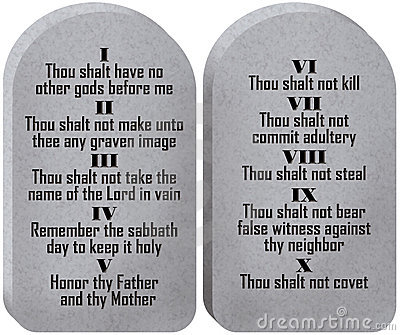
| Home | Our Hope | |
| Bible Study |

|
July 12, 2015 |
| Homosexuality and the Law | ||
There is an argument that some people use to get Christians to accept homosexuality. This argument has been around for quite a while but it resurfacing with new strength with the recent Supreme Court decision allowing homosexual marriage throughout the country. At the same time many churches have now started to allow homosexual marriage. Therefore it's time to look at that argument again so that we can fight against it when we hear it.
The argument is that Leviticus says that many things are wrong including homosexuality, but Christians do all the things that Leviticus says are wrong except homosexuality. If Christians can do all these things that are wrong then why can't they accept homosexuality? Homosexuality is just an old law that remains from a bunch of old laws that Christians have discarded and it needs to be discarded too.
Most Christians don't read Leviticus much so their first reaction is "Huh? What are you talking about?" They are talking about Leviticus 11 primarily. Leviticus 11:1-8 describes the process for identifying which land animals are not to be eaten and this includes horses, pigs, and rabbits. Leviticus 11:9-12 describes water animals that are not to be eaten. Basically, everything without both fins and scales is not to be eaten. That would take lobster, crab, and oysters off the menu. Leviticus 11:13-19 describes birds not to be eaten. Leviticus 11:20-23 describes insects not to be eaten - not much of a restriction for most people in North America. In addition this chapter generally says that you shouldn't even touch these things.
But Christians do eat many of these things. Why are we disobeying the Bible? If we are disobeying the Bible there why are we holding on to what Leviticus says about homosexuality? That's what we will look at in this lesson.
The easy answer to the question of food is to say that the Apostle Paul said that we can eat all these things.
Everything that is sold in the butcher’s shop you may eat without inquiry because of conscience. 26 For the earth is the Lord Yahweh’s with its fullness. (1 Corinthians 10:25-26)
Similarly we can answer the question of homosexuality in the same way, by saying the Apostle Paul said that it is wrong.
But we know that the Written Law is good if a man will be led by it, according to the Written Law, 9 while he knows that the Written Law was not appointed for the righteous, but for the evil, the rebellious, the wicked, for sinners, for the vicious, for those who are impure, for those who strike their fathers, those who strike their mothers, for murderers, 10 for fornicators, for males who lie down with males, for kidnappers of free men, for liars, for oath breakers and for all things opposed to the sound teaching 11 of The Good News of the glory of the Blessed God, with which I have been entrusted. (1 Timothy 10:8-11)
They didn't have a single word for homosexuality back then. They just referred to it as a man laying down with a man as though he was a woman.
On a side note, it could be argued that we don't have a single word for homosexuality either. The word we use is actually an odd combination of a Greek word and a Latin word. Such an odd combination, however, does seem like the right way to build a word to describe this act because the act in itself is an odd combination.
So we could end this lesson right here by saying "Paul said it, and Paul was called by God to be an apostle, therefore that's all that's needed." That would leave a nagging question behind. We know that God does not change but it seems like he changed his mind about animals that can be eaten. Then if he changed his mind about that can't he change his mind about homosexuals?
In short, God did not change his mind. Understanding that, however, will take a bit of digging but in the end we'll have a deeper understanding of the Bible. That's where we are going.
God created man with a conscience. That conscience is essentially God's definition of right and wrong - God's Moral Law. If we will listen to it and obey it we will live lives that are perfect before God. Unfortunately we live in bodies that are full of sinful desires that are against God's Moral Law. The result is that we cannot live perfect lives.
This diagram shows the relationship of man to God's law from the time of creation. The yellow area in the stick-man's head is how I've chosen to show the conscience

|

|
 Man |
This system was a failure. Man's willingness to follow the desires of his body overwhelmed the conscience. In time the world became very sinful and God destroyed it in a flood.
So God added some things to help man to know what was right and wrong.

|

|

|

|

|
 Israel |
|
|
 Gentile |
God added the Ten Commandments written on stone tablets. These were the outline of God's Moral Law. If man would study and think about these he would know right and wrong better than he would through his conscience alone.
God did something else at the same time though. He chose the people of Israel to be his people. They were to be the living examples of the benefits of living according to God's Moral Law.
In choosing Israel to be his people, God made a covenant (legal agreement) with them. They would be his people and he would be their God. As part of that agreement he was their king and he gave them laws for how to live their daily lives. There were food laws, holidays (holy days), a legal system, religious practices, atonement system, and much more. We saw some of the food laws described above in Leviticus.
God's Moral Law has always applied to all mankind. In this covenant that was written on tablets of stone by the finger of God himself. This conveyed their permanence. The additional laws were written only on the scrolls, given by angels to be written by Moses, and only for Israel. This created something that hadn't existed before, two classes of people, Israel and the gentile peoples. Gentile people could become part of Israel by agreeing to live under that covenant and by learning the covenant.
One of the purposes of this covenant was to keep God's people living righteously until the promised Messiah would come. When he came though they had drifted so far from God that they did not recognize the Messiah and they killed him. In doing this they brought an end to the first covenant. They didn't understand that they were doing that and they also didn't understand that they were bringing into being a new covenant.
It isn't very common in our time but there was a time when covenants were marked with a drop of the blood of the persons in the covenant. For the first covenant this blood came from a sacrificed animal. For the second covenant the blood came from the promised Messiah, himself God.
Just as the conscience had failed, the first covenant had failed … if by failure you mean the great promise of that covenant was killed on a Roman cross by the priests, God's representatives, under that covenant.

|

|

|

|
 New Man |
Shortly after the Messiah arose from the grave and ascended to Heaven, the terms of this new covenant were fulfilled. Prior to this time God had provided his spirit to very few men to indwell and guide them. Under this new covenant, God provided his spirit to guide all mankind and to indwell those who would accept the Messiah by faith.
The Holy Spirit acts as a law that is written into our hearts so that we can fully understand and apply it. It isn't a new law, however. It's foundation is still God's Moral Law. That's why the church still teaches the Ten Commandments as did the Apostle Paul.
With the end of the first covenant came the end of the special relationship between God and Israel. No longer would there be a separation between Israel (Jew) and Gentile. Instead they would become one, a new man.
We have enough understanding now to go back and answer the original questions. Leviticus describes some things that are part of that special relationship with Israel but it also describes or details things that are from the tablets. The food laws of the first covenant are part of that special relationship. What Leviticus says about homosexuality comes from the commandments on the tablets. The 7th commandment talks about adultery. The deeper understanding of that commandment is that any sexual relationship outside of that between a husband and wife is against God's Moral Law.
The end of the first covenant does not mean we can throw out the Old Testament, more than half of the Bible. While many things that were part of that covenant are not part of the new covenant, they are still useful to Christians. The Apostle Paul says:
But you should abide in those things that you have learned and of which you are assured, for you know from whom you have learned them, 15 and because from your childhood you were taught the Holy Scrolls which can make you wise unto the life in the faith of Yeshua The Messiah. 16 Every writing which is written by The Spirit is profitable for teaching, for correction, for direction and for a course in righteousness, 17 that the man of God will be perfect and perfected for every good work. (2 Timothy 3:14-17)
Now we are able to understand that the Apostle Paul didn't discard God's teachings on foods and other things on his own, nor did God change his mind about what is right and wrong.
 Where in the Bible does it say homosexuality is wrong? Where in the Bible does it say homosexuality is wrong?
|
Old Testament New Testament Both |
 When did God's Moral Law come into effect? When did God's Moral Law come into effect?
|
At creation After the Ten Commandments were given to Moses After Jesus was resurrected |
 Which of the Ten Commandments is against homosexuality? Which of the Ten Commandments is against homosexuality?
|
5th 6th 7th 8th |
|
| |